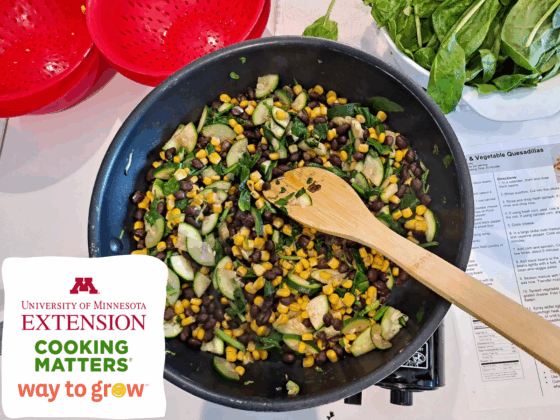Parents know that school mornings can be the busiest time of the day. Between getting kids to school on time, signing permission slips, making sure homework is done, and everything else, breakfast can be a last minute thought. However, unless you are certain your child is eating breakfast at school, breakfast at home is vitally important.
For years we’ve been told we need to eat breakfast. It’s undeniably good for you! Every night, most of us fast, or go a period of time without food, for eight to ten hours as we sleep. To break the fast, it is important we eat breakfast and jump start our day. Breakfast provides important energy to the body and the brain which in turn enables all of us, including our children, to feel better, think better, learn better, and perform better.
Here are a few ideas for a healthy, quick, and low-cost breakfast on those busy mornings:
- Enjoy homemade granola on top of a fruit and yogurt parfait, or as a standalone cereal (great hot or cold)
- Make oatmeal with fat-free or low-fat milk and add fresh, frozen, dried or canned fruit
- Try grits with light coconut milk with canned mango or peaches in light syrup or its own juices
- Make a fruit smoothie with low-fat milk, fruit, and peanut butter
- For a special treat, enjoy a delicious fruit tart
Eating breakfast is a lifelong habit worth teaching your child. It is important to remember that as the parent, you set the example. Even if you are not usually hungry in the morning, or don’t like typical breakfast foods, try a light yet well-balanced breakfast with at least three food groups. The reality is, almost any dish can be eaten for breakfast. So go ahead and serve those leftovers!
By planning ahead and forming good habits, your family will see that eating breakfast is not only quick and easy, but is also a great way to spend time in the kitchen together and set your day off to a strong start.
The University of Minnesota Extension’s Health and Nutrition, Supplemental Nutrition Assistance Program (SNAP) Education program is excited to partner with Way to Grow and has a shared vision for healthier families. Our education provides Minnesota families with tools and strategies to help counter the effects of food insecurity, poverty and obesity. One of the classes we offer is Cooking Matters® Minnesota. This is a six-week series of cooking-based nutrition education program that empowers people to eat healthier and make better use of their food resources. Program graduates report an increase in confidence to prepare healthy meals and excitement over understanding food labels and ways to stretch food dollars. Parents realize that small changes in how their families eat can make big differences in the end. Most importantly more families find making the healthy choice is now a much easier choice.
For more information on the University of Minnesota Extension’s Health and Nutrition, SNAP-Ed program, contact: Evalyn Cabrey, MS, RD, SNAP-Ed Regional Coordinator (Metro), at ecarbrey@umn.edu or 612-624-9942.
This article was written by Sharmyn Phipps, SNAP-Ed Educator
University of Minnesota Extension, Health and Nutrition Programs, SNAP Education


